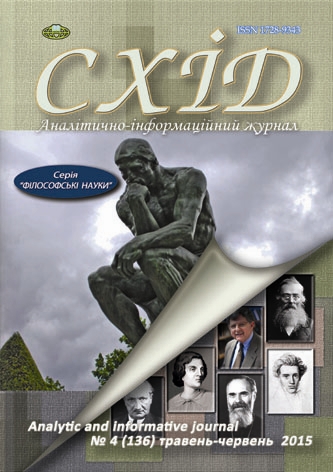Cultural forms of existence of philosophy: typological aspect
DOI:
https://doi.org/10.21847/1728-9343.2015.4(136).48401Keywords:
philosophy, culture, typology, form of existence of philosophy in cultureAbstract
The paper typologizes the main cultural forms of philosophy, based on philosophizing means they use, namely knowledge, values and practical norms. Towards this end, the author firstly examines the invariant essence of philosophy and its specific sociocultural function; identifies those major spheres of culture the synthesis with which gives rise to some forms of philosophy; introduces the concept 'the form of existence of philosophy in culture' as a special category; defines some possible and historical forms of existence of philosophy and specificity of their cultural language; discerns 'the forms of existence of philosophy in culture' and inner 'generic forms of philosophy' as well as some 'philosophical genres and styles'.
It is shown that philosophy may acquire different forms of synthesis with the main spheres of culture. In each of such forms, philosophy uses the available cultural potential of language, symbols, primary philosophemes and intuitions to fulfil its major task - reflexive comprehension of the fundamentals of culture and their main categories as well as deriving universal, common knowledge of man and his place in the world.
The author proposes a tentative typology of the main cultural forms of philosophy, based on generalization of philosophizing means. As a result, there are three types of philosophies identified: 'philosophy of knowledge', 'philosophy of values' and 'philosophy of practical norms'.Downloads
References
Averintsev S. (2010), Mystic, New Encyclopedia of Philosophy. Vol. 2, Mysl, Moscow, p. 579-580 (rus).
Baumeyster A. (2014), Being and benefit, T.P. Baranovska, Vinnytsia, 417 p. (ukr).
Kimelev Yu. (2006), Philosophical theology, Religious. Encyclopedic Dictionary, Akademicheskii proekt, Moscow, p. 1115-1117 (rus).
Krymskii S. (2003), Philosophy - adventure spirit or meaning of the liturgy? Request philosophical meanings, Parapan, Kyiv, 239 p. (ukr).
Krymskii S. (2003), Value-semantic universe of man, Request philosophical meanings, Parapan, Kyiv, 239 p. (ukr).
Mayorov G. (2004), Philosophy as the search for the Absolute. Experiments theoretical and historical, Editorial URSS, Moscow, p. 37-49 (rus).
Ovsienko F. (2006), Religious philosophy, Religious. Encyclopedic Dictionary, Akademicheskii proekt, Moscow, p. 865-866 (rus).
Prychepii Ye. M., Chernii A. M., Chekal L. A. (2007), Philosophy, Akademvydav, Kyiv, 592 p. (ukr).
Semygin G. (2010), Ideology, New Encyclopedia of Philosophy. Vol. 2, Mysl, Moscow, p. 81-83 (rus).
Stepin V. (2010), Culture, New Encyclopedia of Philosophy. Vol. 2, Mysl, Moscow, p. 341-347 (rus).
Stepin V. (2010), Science, New Encyclopedia of Philosophy. Vol. 3, Mysl, Moscow, p. 23-28 (rus).
Stepin V. (2010) Philosophy, New Encyclopedia of Philosophy. Vol. 4, Mysl, Moscow, p. 195-200 (rus).
Stryzhevskyi V. (2014), Ontology, Dukh i Litera, Kyiv, 288 p. (ukr).
Khamitov N. (2006), Philosophy. Genesis. Man. World, KNT, Tsentr uchebnoі literatury, Kyiv, 456 p. (rus).
Downloads
Published
How to Cite
Issue
Section
License
Copyright (c) 2015 Gennadii Khrystokin

This work is licensed under a Creative Commons Attribution-NonCommercial-NoDerivatives 4.0 International License.
1. Authors bear responsibility for the accuracy of facts, quotations, numbers and names used.
2. Manuscripts are not sent back.
3. The publisher does not always agree with the authors' opinion.
4. The authors reserve the right to authorship of the work and pass the first publication right of this work to the journal under the terms of a Creative Commons Attribution-NonCommercial-NoDerivatives 4.0 International License. This license allows others to distribute (copy) the published work for non-commercial purposes, provided there is mandatory attribution to its authors and a link to the first publication in our journal.
5. The authors have the right to conclude separate supplement agreements that relate to non-exclusive work distribution in the form in which it has been published by the journal (for example, to upload the work to the online storage of the journal or publish it as part of a monograph), provided that the reference to the first publication of the work in this journal is included.

